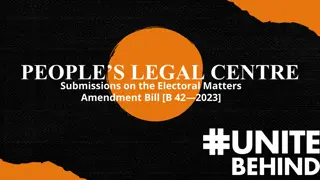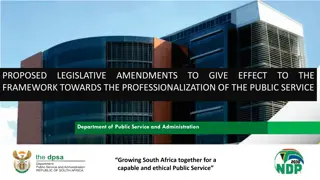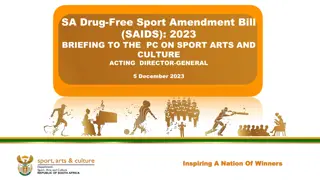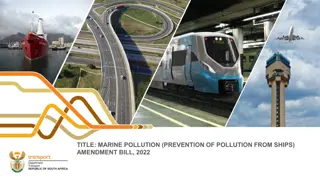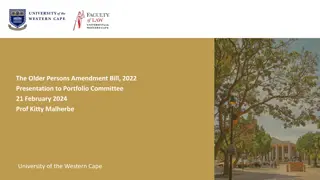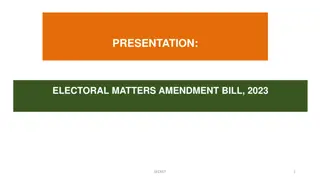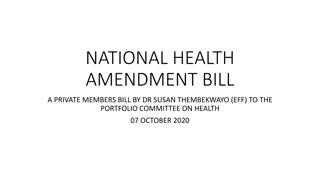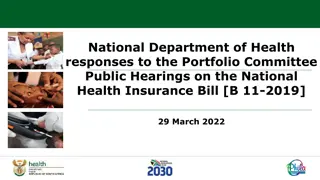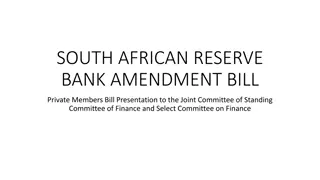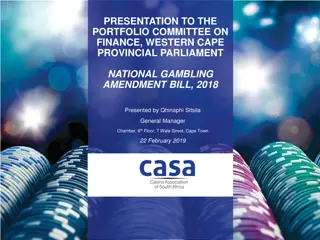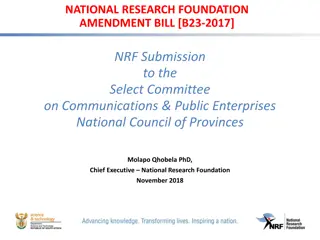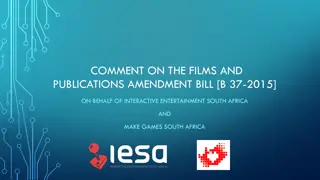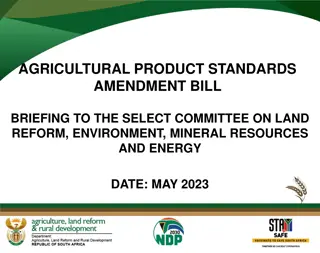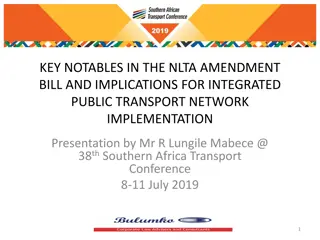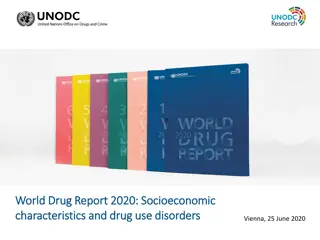Amendment Bill 2023 for Drug-Free Sport in South Africa
The Amendment Bill 2023 aims to address non-compliant issues highlighted by WADA in the South African Institute for Drug-Free Sport Act. The bill underscores the importance of fair play, anti-doping regulations, and the well-being of athletes. It outlines the background, purpose, and steps involved in amending the existing legislation to align with international standards.
Uploaded on Mar 23, 2024 | 0 Views
Download Presentation

Please find below an Image/Link to download the presentation.
The content on the website is provided AS IS for your information and personal use only. It may not be sold, licensed, or shared on other websites without obtaining consent from the author. Download presentation by click this link. If you encounter any issues during the download, it is possible that the publisher has removed the file from their server.
E N D
Presentation Transcript
SA Drug-Free Sport Amendment Bill; 2023 pursuant to the non-compliant declaration by WADA Select Committee on Education and Technology, Sport, Arts and Culture (Wednesday, 28 February 2024)
Presentation Outline Purpose Background WADA Ruling and Consequences OCSLA and Cabinet Parliament Non-compliant provisions in the SAIDS Act, as amended Consultations
Purpose To provide a background to the Select Committee on Education and Technology, Sport, Arts and Culture with the following: Reasons for the need to amend the South African Institute for Drug-Free Sport Amendment Act; 1997 (Act No. 14 of 1997) as amended (NB: As amended includes all the subsequent amendments so, no need to mention 2006) Steps to be undertaken in fast-tracking the promulgation of the South African Institute for Drug-Free Sport Bill; 2023) (SAIDS bill will always be called the 2023 Bill until proclaimed, this is the year the Bill was developed) To submit the Draft South African Institute for Drug-Free Sport Bill; 2023 to the Portfolio Committee for consideration and further processing.
Background The South African Institute for Drug-Free Sport (SAIDS) (a National Anti-Doping Agency) is a public entity of the Department of Sport, Arts and Culture (the Department) established by an Act of Parliament, that is the South African Institute for Drug-Free Sport Act; 1997 (Act No. 14 of 1997) as amended by the South African Institute for Drug-Free Sport Amendment Act; 2006 (Act No. 25 of 2006). (Both Acts are attached hereto as Annexure A and B , respectively) Both the 1997 Principal Act and the Amendment Act; 2006 basically promote participation in sport free from the use of prohibited substances or methods intended to artificially enhance performance, thereby rendering impermissible doping practices that are contrary to the principles of fair play and medical ethics, in the interest of the health and well- being of sportspersons; and to provide for matters connected therewith. However, the Amendment Act; 2006, further provides amongst others for the adoption of matters contained in the 2021 World Anti-Doping Code (WADA Code). (Attached hereto is the Copy of the WADA Code as Annexure C ).
Cont The World Anti-doping Agency (WADA) was established in 1999 as an international independent agency to lead a collaborative worldwide movement for doping-free sport. WADA s governance and funding are based on equal partnership between the Sport Movement and Governments of the world. WADA s primary role is to develop, harmonize and coordinate anti-doping rules and policies across all sports and countries. Their key activities include scientific and social science research; education; intelligence and investigations; development of anti-doping capacity; and monitoring of compliance with the World Anti-Doping Programme. On 31stOctober 2022, WADA identified several provisions in the 2006 Amendment Act, that are non-compliant with the WADA Code and provided a Corrective Action Report, identifying those non-compliant provisions that must be amended with a timeline of 31st January 2023. (Attached hereto is a Copy of the Corrective Action Report as Annexure D ). The Department of Sport, Arts and Culture (the Department) and the South African Institute for Drug-Free Sport (SAIDS) informed WADA that the deadline was unreasonable, and explained the reasons as to why it could not guarantee the promulgation of the 2006 Amendment Acts within the prescribed deadline, including the fact that legislative amendment is a Constitutionally prescribed with stringent processes.
Cont Notwithstanding the advice that the deadline was unreasonable, the Department still reassured WADA of its commitment to have the legislation aligned with the WADA Code. Despite the efforts of engaging with the Compliance Unit of WADA in producing four drafts of the amendments to the Amendment Act; 2006, the last of which was submitted on the 21stof September 2023. On 22 September 2023, WADA s Executive Committee at their meeting in Shanghai, China, accepted the Compliance Review Committee s recommendation to allege that the SAIDS was non-compliant with the Code. The Executive Committee also accepted the Compliance Review Committee s recommended consequences for this non-compliance as well as the reinstatement conditions.
WADA Ruling and the Consequences The consequences are that South Africa will not be awarded the right to host or fly the South African flag at regional, continental and World Championships, and Events organized by Major Event Organizations, nor will South Africa s flag be flown at the Olympic Games and Paralympic Games, until SAIDS is re-instated. SAIDS was given 21 days, starting from 22ndSeptember 2023 to 13thOctober 2023 (inclusive) to dispute the WADA s allegations of non-compliance and or the consequences of non-compliance and or the reinstatement conditions proposed by WADA. Please note that, when an Appeal is lodged, consequences placed on SAIDS and South Africa by WADA cannot be implemented until the Appeal Process is concluded. On the 13thof October 2023 SAIDS lodged a dispute to WADA. On the 21stof November WADA lodged an Appeal with the Court of Arbitration for Sport (CAS) in Switzerland, as a consequence of same, CAS is in the process of finalising the arbitration panel to adjudicate the dispute.
OCSLA & CABINET The Department and SAIDS worked together in drafting the SA Drug-Free Sport Amendment Bill; 2023 to the effect that on the 26thof September 2023, the Department received a notice from SAIDS that WADA has issued an approved version. The said approved SA Drug-Free Sport Amendment Bill; 2023 version was sent to the Office of the Chief State Law Advisor (OCSLA) on 26thof September 2023, for consideration and certification. Wherein after the SAIDS Amendment Bill; 2023 was certified and the opinion was issued on 1stNovember 2023. (A copy of the Bill, including the OCSLA opinion are attached as Annexure E and F ). The Department presented the Draft Bill to the Cabinet of the Republic on 4thOctober 2023. The Cabinet of the Republic noted the recommendations and approved the processing of Amendment Bill South African Institute for Drug-Free Sport Amendment Act; 2006 (Act No. 25 of 2006) to ensure alignment and compliance with the WADA Code. However, only on the 21stof November 2023, did SAIDS submit WADA s written inputs, comments, and questions on the version of the Bill certified by OCSLA. On 28 of November 2023 SAIDS wrote to OCSLA providing them with WADA s commentary on the Bill Certified by OCSLA. (OCSLA advised SAIDS that it could not address the commentary as the process was already in Parliament.
PARLIAMENT Noting that South Africa had until 22 January 2024 to promulgate the SAIDS Amendment Bill; 2023, the Department addressed letters to the Speaker of the National Assembly and the Chairperson of the National Assembly, requesting to table the Bill, and subsequently Gazetted the notice of intention to table in Parliament. (Attached hereto is a copy of the National Gazette, as Annexure G ). On 30 November 2023, the Bill was Presented to the Portfolio Committee for Sport, Arts and Culture: to advise on the reasons to amend the South African Institute for Drug-Free Sport Act; 1997 (Act No. 14 of 1997) as amended Steps to be undertaken in fast-tracking the promulgation of the South African Institute for Drug-Free Sport Bill; 2023 To submit the Draft South African Institute for Drug-Free Sport Bill; 2013 to the Portfolio Committee for consideration and further processing On 22 February 14 March 2024: The SAIDS Bill was placed on the national, provincial, and regional newspapers On 20-21 February 2024: The Portfolio Committee for Sport, Arts and Culture held oral Submission on the SAIDS Bill with various stakeholders including SAID (Attached hereto is a copy of the Draft Portfolio Committee s Programme as Annexure H ).
Non-compliant provisions in the SAIDS Act, as amended The following definitions were found to be non-compliant by WADA and we were requested to update them in terms of the Code Adverse Analytical Findings, Anti-doping rule violation Athlete, Code, Doping Control, International Standard, International Standard, Possession, Registered Testing Pool, Tampering, and Trafficking. o The rationale for these amendments was that given that the Code has periodic reviews and amendments, WADA recommended that the definitions bear the definition as set out in the Code currently in force". Some of the other definitions have been repealed because the operational function of such defined word/words does not exist and are not aligned with the Code, whilst others were inserted to align with the new amendments as well as the Code. o
Cont Section 6 of the Principal Act, which deals with the Staff of the Institute is intended to be amended, due to the fact that some of the provisions are no longer fit for purpose. For e.g, the Principal 1997 Act prescribed that SAIDS may when entering into Agreements, do so in consultation with the Minister and the Public Service. Section 8(2) of the Amendment Act, made reference to section 6(2), which is intended to be repealed, so there had to be a consequential amendment as well. Section 10 of the Principal Act deals with the Objects of the Institution, which are amongst other to promote and ensure the adoption of a centralised doping control programme, which may subject any athlete to testing, with or without advance notice, both in and out of competition
Cont o WADA suggested that advance notice should be removed as this should only occur in exceptional circumstances, including athletes over whom SAIDS has authority and that it is preferable to refer to intelligent testing as it covers more areas and is broader in case the International Standard for Testing and Investigations (ISTI) changes. Therefore, the Bill should read as follows: "(d) to promote and ensure the adoption of a centralised doping control programme, which focuses on implementing intelligent testing, may subject any athlete to testing, both in-competition and out-of- competition, on athletes over whom it has authority
Cont Section 10(2) prescribed that the Institute shall operate in close conjunction with Sports Information and Science Agency (SISA). Amendment has to be effected to effect that changes from SISA to the Department and includes SASCOC in its operation, the Bill now reads as follows: The institute shall operate independently but may cooperate with SASCOC and the Department from time to time as the need arises in order to achieve the objects of the institute is contemplated in this act.
Cont Section 11 of the 2006 Act provides for the Powers and duties of the Institute and in subsection (2)(b)(c) of the said Section 11, are intended to be repealed as they prescribed that the institution shall establish and maintain a Register of Notifiable Events; and notify relevant persons and organisations of entries into the Register of Notifiable Events The deletion is due to the fact that SAIDS is no longer maintaining this register. There is also an insertion in Section 11 , regarding the consent of a parent, guardian, any school, or any school governing body to the Drug-Testing of a Protected Person by the Institute participating in any non-sporting event sanctioned by a National Sports Federation or National School Sport Body, however this provision has been subsequently removed.
Cont Further insertion Section 11(2)(m) and (n) of the amended Act, includes the Institution: (m) requiring athletes who have been included in the testing pools to provide accurate information on their current whereabouts which should be made available to WADA and to other Anti-Doping Organisations having authority to test the athletes. (n) ensuring that a process for all athletes with documented medical conditions requiring the use of a prohibited substance or method, may request a therapeutic use exemption. Provided that such requests shall be evaluated by a therapeutic use exemption committee in accordance with the International Standard for Therapeutic Use Exemptions. Provided further that the Institute shall promptly report in writing to the WADA such granting of therapeutic use exemptions. of
Cont Section 11A prescribed for the Doping control programme that applies to all athletes, this programme included amongst others authorised the Institute to request an athlete to provide a sample for the purpose of doping control; and required the Institute to establish and maintain a doping register for the programme. Due to the fact that the Institute no longer maintains the doping register, this provision is repealed. Section 11B prescribed that an athlete fails to comply with a request by the Institute to provide a sample if he or she refuses or fails to submit to sample collection as required by the doping control programme. WADA advised that the notion of Failure to Comply under this Act is too restrictive in nature and according to the International Standard for Results Management, a failure to comply means "a term used to describe anti-doping rule violations under Code Articles 2.3 and/or 2.5. as such it was recommended that this provision be repealed. Section 11C prescribed that the Institute may request a sports administration body in writing to arrange for an athlete to undergo doping control in order to determine whether he or she has been using prohibited substances or methods. WADA required SAIDS to confirm how this provision works in practice and how often the Institute requests in writing for a sports administration body to arrange for an athlete to be under doping control or the laboratory analysis of the sample. It was then resolved also, to repeal this provision.
FURTHER PROPOSED AMENDMENTS Section 17 important If Section 17 is to be amended the title for this Section should be amended from "Appeals" to "Results Management" (please see draft Bill dated 26 September 2023). SAIDS strongly recommends that any procedural or substantive results management-related provisions relating to appeals should be excluded from this amended Act. Sections 17 (2)(a) (c), (3), (4), (5), (7)(a) & (8) are non-compliant and therefore must be amended or removed. SAIDS recommends that only Section 17(1) remain in the Amended Act or Section 17 be amended in accordance with the draft Bill approved by WADA dated 26 September 2023. This would notably entail changing the title of this section from "Appeals" to "Results Management SAIDS is of the view that Section 17(2)(a) is non-compliant as it doesn't respect the requirements of Institutional Independence as defined in the Code... Section 17(4)(a) is non-compliant as it is substantively different from the wording of Code Article 13.2, and Code Article 23.2.2 indicates that the wording of this Article must be implemented without substantive changes. This type of procedural provision should be excluded from this Bill as it is otherwise fully addressed in the SAIDS 2021 Anti-Doping Rules.
FURTHER PROPOSED AMENDMENTS Section 17(7)(a) is non-compliant as this would breach the requirements for hearing panels on appeal to be Institutionally Independent as this term is otherwise defined in the Code. By virtue of the Code definition of Institutional Independence, hearing panels on appeal must "not in any way be administered by, connected or subject to the Anti-Doping Organization responsible for Results Management. Accordingly, the procedure should be determined by the Appeal Board itself. Section 17(8) does not correspond with the current anti-doping framework in the Republic of SA because other sporting federations in SA do not have anti-doping rules pursuant to which Consequences & sanctions are outlined in the Code may be imposed against persons guilty of an anti-doping rule violation. Current wording hasreduced 11 Anti-Doping Rule Violations to 1. Please delete / remove this section.
PROPOSED Sec 17 AMENDMENTS NEW HEADING: RESULTS MANAGEMENT 17. (1) (a) There is hereby established an independent board which shall be known as the Anti-Doping Appeal Board (b) The Appeal Board shall consist of nine members, appointed by the Minister, possessing special knowledge and expertise relevant to doping, which must consist of five practicing attorneys or advocates, a sports administrator and two sports medical physicians. (2) Results Management must be the responsibility of, and shall be governed by the procedural rules and anti-doping rules of the National Anti-Doping Organisation as amended from time to time by the Code. (3) Results Management under the anti-doping rules must establish a process designed to resolve anti-doping rule violation matters in a fair, expeditious and efficient manner (4) The Institute must establish a first instance hearing panel named the Independent Doping Hearing Panel (IDHP) which has jurisdiction in the first instance to hear and determine whether an athlete or other person subject to the anti- doping rules has committed an anti-doping rule violation and if applicable to impose relevant consequences.
Consultations Aero Club of South Africa South African Sport Angling and Casting Federation South African National Boxing Organization South African National Archery Association Athletics South Africa Aero Club of South Africa Badminton South Africa South African Baseball Union Basketball South Africa Body building South Africa Bowls South Africa South African National Boxing Organization Boxing South Africa South African Bridge Canoeing South Africa Chess South Africa South African National Climbing Federation Cycling South Africa Cricket South Africa Golf RSA South African Gymnastics Federation South African Football Association South African Figure Skating Association South African Equestrian Federation South African Korfball Federation Darts South Africa Federation of Dance Sport South Africa Lifesaving South Africa Confederation of Cue Sport South African Handball Federation South African Hockey Association Judo South Africa Karate South Africa South African Kickboxing Association Ringball South Africa Martial Art South Africa South African Modern Pentathlon Association South African Rugby Union Motorsport South Africa Netball South Africa South African Orienteering Federation Surfing South Africa Powerboat Racing South Africa South African Powerlifting Federation Softball South Africa Roller Sport South Africa Rowing South Africa South African Table Tennis Board Swimming South Africa Squash South Africa Snow Sports South Africa South African Shooting Sport Federation Triathlon South Africa South African Shooting South African Sailing Sport Federation South African Underwater Sport Federation South African Sports Association for Physically Disabled South African Taekwondo Federation South African Tenniquoits Board Tennis South Africa Tenpin Bowling of South Africa Association South African Weightlifting Federation South African Transplant Sports Association South African Wushu Federation Triathlon South Africa South African Tug of War Federation University Sport South Africa Volleyball South Africa South African Water Ski Federation South African Deaf Sport Federation Sport for the Intellectually Impaired SA South African Masters Sports Association South African Sport Aerobics and Fitness Federation South African National Pigeon Organisation South African Majorette and Cheerleading Association Jukskei South Africa South African Sheep Shearing Federation South African Federation BOCCE Mind Sports SA
Cont PROVINCIAL SPORTS CONFEDERATIONS Eastern Cape Sports Confederation Free State Sports Confederation Gauteng Sports Confederation KwaZulu Natal Sports Confederation Save for the comments received from SAIDS and WADA only the following were submitted: National Treasury SA Rugby Union Public Enterprise (Confirming that they have no inputs to submit)
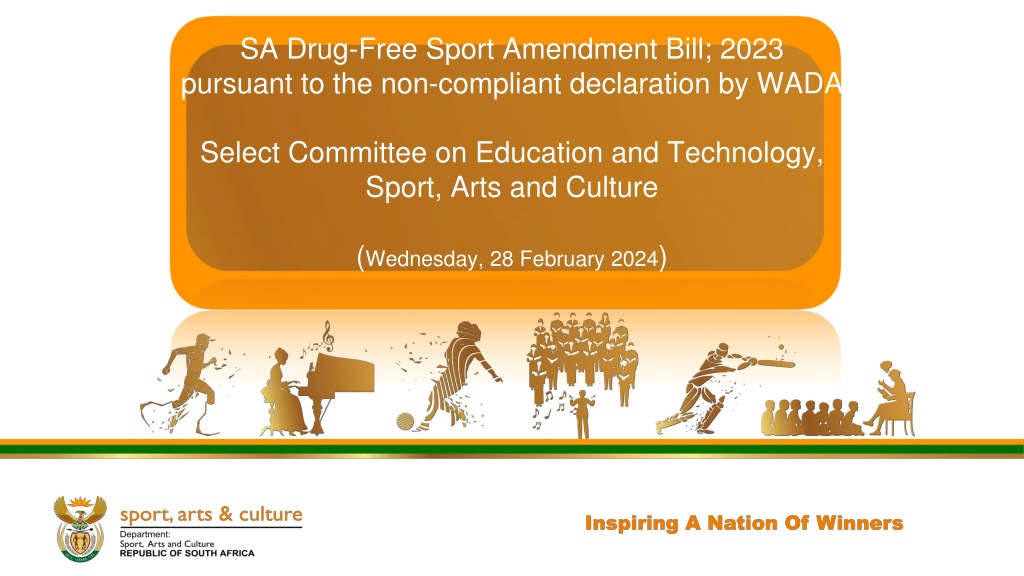

![RE: ELECTORAL MATTERS AMENDMENT BILL [ B42-2023]](/thumb/18837/re-electoral-matters-amendment-bill-b42-2023.jpg)
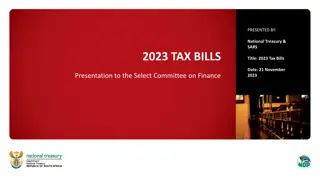
![Enhancing Corporate Transparency: Analysing The Companies Amendment Bill [B27B-2023]](/thumb/60028/enhancing-corporate-transparency-analysing-the-companies-amendment-bill-b27b-2023.jpg)
